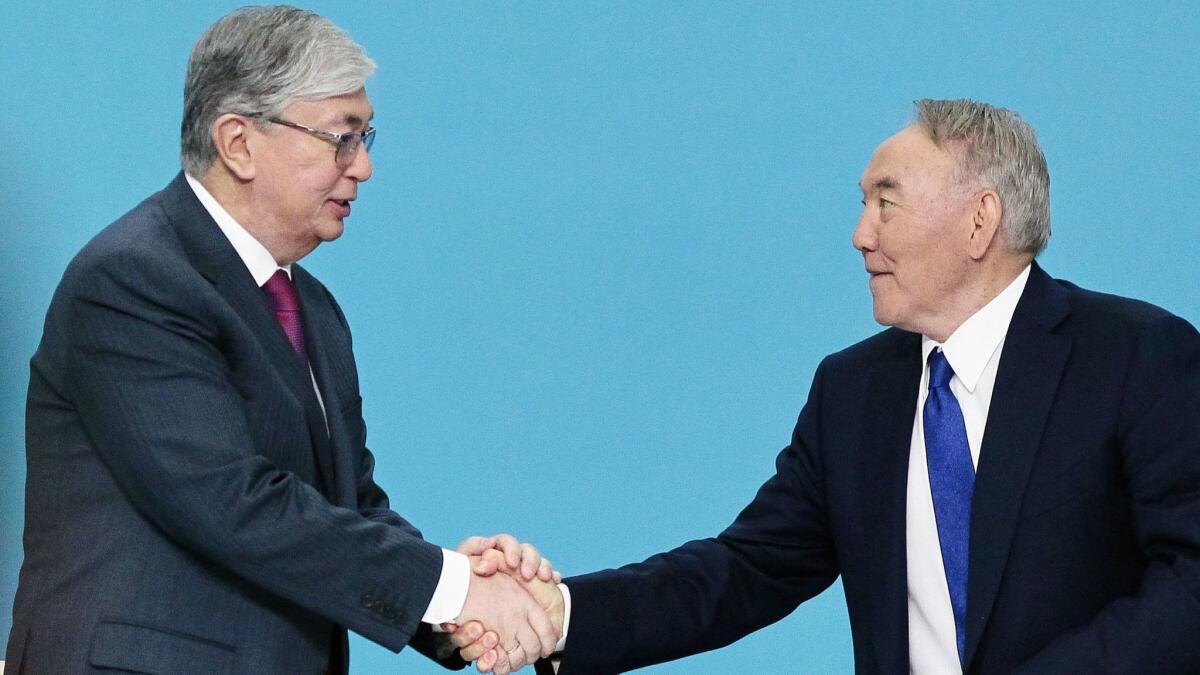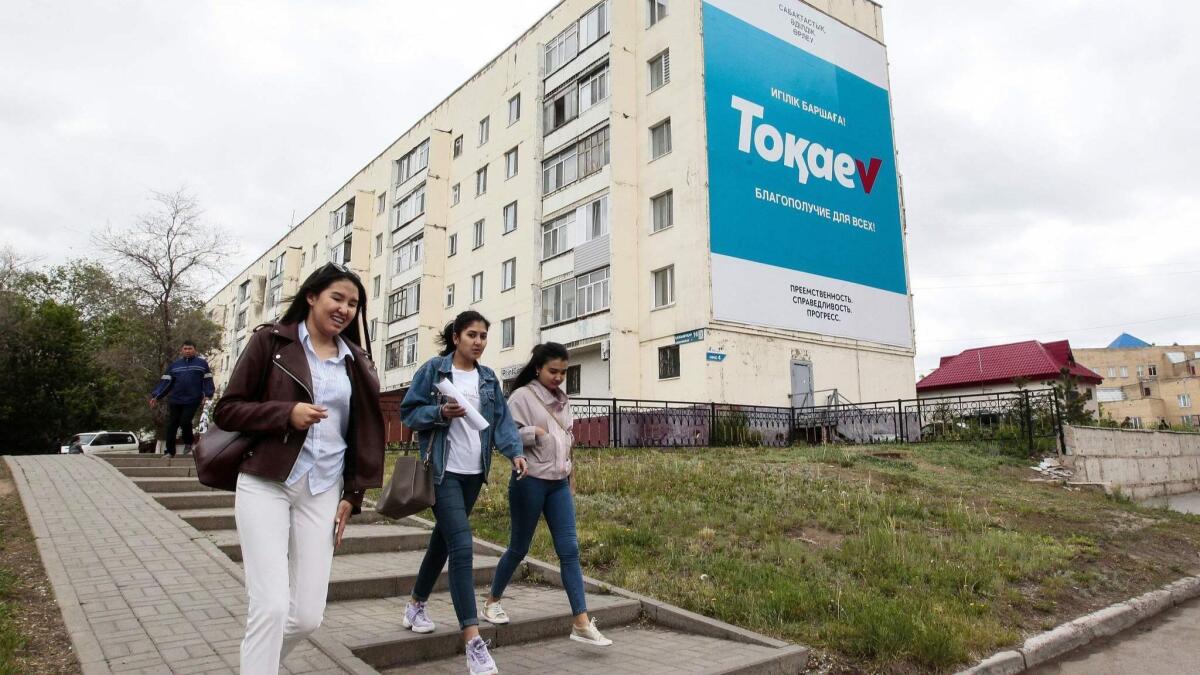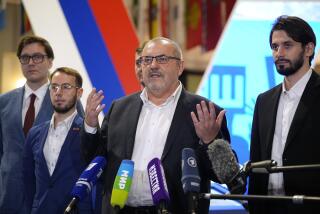Presidents may come and go. In Kazakhstan, there’s only one Father of the Nation

- Share via
Reporting from Moscow — Few leaders have put their stamp on a country quite like Nursultan Nazarbayev, who ruled Kazakhstan with an authoritative grip for 30 years after the fall of the Soviet Union. When he stepped down in March, the country immediately named the capital city Nur-Sultan in his honor.
On Sunday, Kazakhs will go to the polls for a presidential election to choose his successor. But that doesn’t mean Nazarbayev won’t remain in command of this gas-rich Central Asian nation of 18 million.
When Nazarbayev, 78, announced his resignation as president, he nominated Kassym-Jomart Tokayev to serve as his interim successor, pending elections. The move was seen as Nazarbayev’s plan to oversee the transition of power in a way that would preserve his legacy.
“The concerns of the country and the people remain my concerns,” he said in a televised address on March 19.
Tokayev is widely expected to win the election, in a field of nine candidates that includes one moderate opposition figure, Amirzhan Kossanov. But his power will be subordinate to that of Nazarbayev, who retained two important positions when he left office. The first is a loosely defined title of Father of the Nation, an accolade he essentially bestowed on himself via parliament nearly a decade ago.
More important, Nazarbayev remains chairman of Kazakhstan’s powerful Security Council, whose members include the top brass from the country’s security and military services. The council has more power than the president, so whoever wins the presidency will still be under Nazarbayev’s tight control.
Nazarbayev has used a heavy hand to guide Kazakhstan, a former Soviet republic, through decades of a post-communist transition that has turned the country into Central Asia’s economic powerhouse. Kazakhstan’s vast landmass of steppes lies in the crossroads of Russia and China, and Nazarbayev enjoys a close relationship with Russian President Vladimir Putin, while welcoming China’s investment in Central Asia.
But in rebuilding Kazakhstan into a modern economy, Nazarbayev has quashed opposition voices, independent media and public dissent. His critics say corruption and nepotism have kept Nazarbayev’s grip on political and economic power.
He’s the only leader his country has known since independence. Now he’s stepping down ... sort of »
Many believe Nazarbayev’s ultimate goal is for his eldest daughter, Dariga Nazarbayeva, to become president. Just days after her father resigned, Nazarbayeva became the chairwoman of the country’s Senate, filling the role left open by Tokayev’s appointment as interim president. Kazakhstan’s constitution dictates that the Senate chairman become interim president should the president leave office for any reason.
“Tokayev is an obedient tool in the hands of Nursultan Nazarbayev and his clan family,” said Talgat Mamyraiymov, an independent political analyst in Almaty, the country’s largest city. “This election is an imitation of democracy primarily to show the West some kind of legitimacy for Tokayev’s election.”

Some other former Soviet republics, such as Georgia and Ukraine, modeled their political systems after Western democracies. But Kazakhstan looked not to Europe but to nearby authoritarian states, such as Russia and China, Mamyraiymov said.
In addition, Kazakhstan looked to its own pre-Soviet history, where it found an unlikely inheritance.
“Our political system is based on traditional values, which in many ways have their roots in the empire of Genghis Khan,” Mamyraiymov said. The Mongol ruler conquered the Central Asian steppes in the 13th century.
“The descendants of Genghis Khan implemented their own management system based on totalitarian values, the absence of the institution of human rights, complete conformism and suppression of political dissent,” he added.
Even so, a wave of nationwide protests last year began to rattle Nazarbayev’s leadership. And protests ahead of the elections, followed by numerous arrests and detentions of young activists, is presenting a challenge to the Nazarbayev’s desire to oversee a controlled transition of power.
The protests began as pleas for better economic conditions but turned political with demands for free and fair elections. Perhaps more worrying for the ruling elite, the organizers of the protests are young activists inspired by street protests that have led to change in Ukraine and other post-Soviet republics.
From the archives: Nazarbayev was already cementing power in the Soviet era »
Security services have cracked down by threatening to have the protesters expelled from universities. Their parents have been told they could lose their jobs. At least three protesters are being investigated for being part of an “extremist” organization for calling for protests on social media.
At least six male protesters have been called up for military service before election day, a move they claimed was done to keep them off the streets on Sunday.
Despite the threats and risks, Daniyar Khassenov, 23, a human rights defender from Almaty, said he believes mass protests are the only way to bring change in Kazakhstan.
“We’ve seen in other countries that protests do work, such as in Ukraine and Georgia, even the European Union and the United States.”
The turnout for demonstrations has grown from several hundred to several thousand over the last year. Those numbers may be small by Western standards, but they are notable for Kazakhstan, Khassenov said.
He wants the government to change the requirements for presidential candidates to register, which include having already worked for the government for five years and being a member of a political party. Under the current requirements, about 95% of Kazakhs are not eligible to be president, he said.
Khassenov and eight other young activists have gathered more than 1,000 signatures in an open letter to Donald Tusk, the president of the European Council, asking for recognition of Kazakhstan’s human rights violations. The letter has been posted across social media, promoting several visits from the Kazakh security services to Khassenov’s home.
ALSO:
Review: Patriotic Kazakh drama ‘Road to Mother’ strong on earnestness and landscapes
Aboard the longest trolleybus in the world in one of the most disputed places in Europe
‘Are these people godless?’ Putin asks as Russian protesters denounce cathedral plans
Twitter: @sabraayres
Ayres is a special correspondent.
More to Read
Sign up for Essential California
The most important California stories and recommendations in your inbox every morning.
You may occasionally receive promotional content from the Los Angeles Times.










